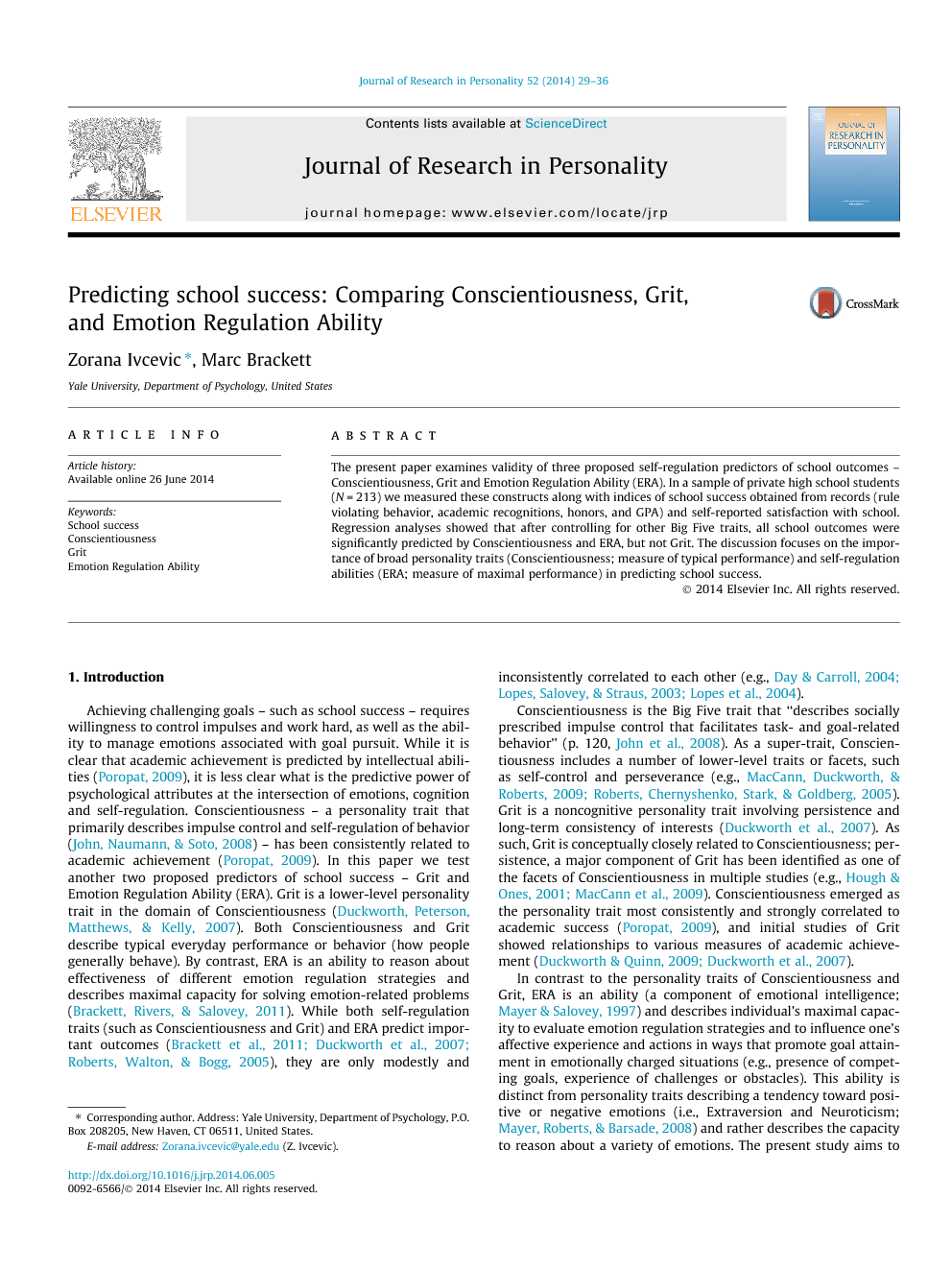The present paper examines validity of three proposed self-regulation predictors of school outcomes – Conscientiousness, Grit and Emotion Regulation Ability (ERA). In a sample of private high school students (N = 213) we measured these constructs along with indices of school success obtained from records (rule violating behavior, academic recognitions, honors, and GPA) and self-reported satisfaction with school. Regression analyses showed that after controlling for other Big Five traits, all school outcomes were significantly predicted by Conscientiousness and ERA, but not Grit. The discussion focuses on the importance of broad personality traits (Conscientiousness; measure of typical performance) and self-regulation abilities (ERA; measure of maximal performance) in predicting school success.
Achieving challenging goals – such as school success – requires willingness to control impulses and work hard, as well as the ability to manage emotions associated with goal pursuit. While it is clear that academic achievement is predicted by intellectual abilities (Poropat, 2009), it is less clear what is the predictive power of psychological attributes at the intersection of emotions, cognition and self-regulation. Conscientiousness – a personality trait that primarily describes impulse control and self-regulation of behavior (John, Naumann, & Soto, 2008) – has been consistently related to academic achievement (Poropat, 2009). In this paper we test another two proposed predictors of school success – Grit and Emotion Regulation Ability (ERA). Grit is a lower-level personality trait in the domain of Conscientiousness (Duckworth, Peterson, Matthews, & Kelly, 2007). Both Conscientiousness and Grit describe typical everyday performance or behavior (how people generally behave). By contrast, ERA is an ability to reason about effectiveness of different emotion regulation strategies and describes maximal capacity for solving emotion-related problems (Brackett, Rivers, & Salovey, 2011). While both self-regulation traits (such as Conscientiousness and Grit) and ERA predict important outcomes (Brackett et al., 2011, Duckworth et al., 2007 and Roberts, Walton, et al., 2005), they are only modestly and inconsistently correlated to each other (e.g., Day and Carroll, 2004, Lopes et al., 2003 and Lopes et al., 2004).
Conscientiousness is the Big Five trait that “describes socially prescribed impulse control that facilitates task- and goal-related behavior” (p. 120, John et al., 2008). As a super-trait, Conscientiousness includes a number of lower-level traits or facets, such as self-control and perseverance (e.g., MacCann et al., 2009 and Roberts, Chernyshenko, et al., 2005). Grit is a noncognitive personality trait involving persistence and long-term consistency of interests (Duckworth et al., 2007). As such, Grit is conceptually closely related to Conscientiousness; persistence, a major component of Grit has been identified as one of the facets of Conscientiousness in multiple studies (e.g., Hough and Ones, 2001 and MacCann et al., 2009). Conscientiousness emerged as the personality trait most consistently and strongly correlated to academic success (Poropat, 2009), and initial studies of Grit showed relationships to various measures of academic achievement (Duckworth and Quinn, 2009 and Duckworth et al., 2007).
In contrast to the personality traits of Conscientiousness and Grit, ERA is an ability (a component of emotional intelligence; Mayer & Salovey, 1997) and describes individual’s maximal capacity to evaluate emotion regulation strategies and to influence one’s affective experience and actions in ways that promote goal attainment in emotionally charged situations (e.g., presence of competing goals, experience of challenges or obstacles). This ability is distinct from personality traits describing a tendency toward positive or negative emotions (i.e., Extraversion and Neuroticism; Mayer, Roberts, & Barsade, 2008) and rather describes the capacity to reason about a variety of emotions. The present study aims to examine the independent predictive power of Conscientiousness, Grit, and ERA in relation to measures of high school success.


